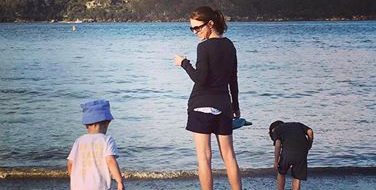I imagine death so much it feels more like a memory.
The best things always begin in the dark.
This hasn’t kept me from being afraid of darkness for most of my life. When I was a kid, I went around the house turning on lights until my dad put a moratorium on unnecessary electricity, telling me I was running up the power bill. Light has always felt like protection–fewer things, bad things, can hide in the light.
Maybe that’s why I’ve always embraced hypochondria: if I could imagine it, see it happening to me, and fear it, then surely it wouldn’t? Shining a light on cancer, on aneurysms, on everything that could go wrong with my body–this would protect me? Like expecting to get struck by lightning and thereby outrunning it. When we were young enough to be left alone but not old enough to be unafraid (is anyone, ever? the fears just change), my mom would go to her grad school classes at night and I would imagine car accidents, knocks on the door, until she got home safely.
So yes, I suppose I’ve always been a bit of a downer.
But then there is the day when you learn what is on the other side of death, death itself being a catch-all word for anything that veers from our original plan; death being everything from mortality to diagnoses, differences, loneliness, tears, broken hearts, physical maladies, mental struggles.
And perhaps the biggest: childbirth. Or maybe just parenthood, period.
Last week, The Kid’s school began their year two swimming scheme: two weeks of intensive instruction at a local aquatic centre with the kids grouped according to ability. Immediately upon hearing that term–ability–I bristled, my advocacy sensors blaring. I hoped, prayed, that he would be granted a teacher who would give him a chance to show all that he’s learned from years of swim lessons, who would not let the sight of his therapist lead to lower expectations and inequitable treatment.
Apparently, the answer to that prayer was a maybe next time.
His therapist told me how the instructor had let all the other kids swim a length to show their skill level, but that TK and the other kid with a carer were told to walk. Then, she told me, my boy was all, “F this noise” and began to swim anyway, much to the surprise of the instructor, who apparently equates the spectrum with physical and mental flatlines. She persisted in her misapprehensions, insisting that TK have a carer with him in the pool at all times, and though I’m the one who has been at those swim lessons with him through the years, who has lived in three different homes with pools he has traversed countless times on his own, when it comes to informing someone who Always Knows Better, I’m just the Mom Who Irrationally Defends Her Kid. (Hey, I’ve been called worse.)
So I kept him home one morning, swimming with him myself, working on his stroke while we laughed together through my anger and emotion. And the next day, his non-swim teacher told me he wanted to get in the pool with him the next time his therapist couldn’t be there.
I had died a little when my boy was not seen; then I was brought back to life by the people who do see him.
And as his confidence grows alongside these deaths and resurrections, he ventures out more into the world than ever before. Three days in a row last week we went on bush walks, crossing over branches and stumps and all the sorts of things that would have turned him around before, back to the familiarity of home, and now he presses on, exclaiming along the way: “This is so fun!” “It’s the best day of my life!”
And I meditate, daily or just when I can, in the friend-recommended savasana, or corpse pose. Practicing for death, which really just feels like letting go. So much of death is letting go. So much of life is.
They say that when the Romanovs were told to go to the cellar of The House of Special Purpose (morbid, I know, but I’m a bit obsessed; sue me), they thought they were going to be transported somewhere new, so they brought their jewels with them, fastening the gems to the inside of their clothes, weighing themselves down with the material, so that when, instead of being moved they were executed, the stones acted like bullet-proof vests, making them harder to kill and extending the nightmare until the soldiers stopped shooting and started using their bayonets instead.
Clinging, it so seldom leads to life.
On Mondays, especially ones after disco parties and late weekend nights, I awaken before the alarm and the sun is over an hour away, and I put on my shoes and drive through the dark to where others will meet me and we will walk toward the dawn. Lately, the sun has been inching closer, earlier, but it is only in the darkness that I see its promise. I was a different person: before New York, before kids, before Sydney. Each time, I had to die before I could come to life. This is the order: it’s not fair, but it’s true. And every time, every time, I see it as a reminder, as a promise kept: the things that bring us through the darkness, that bring us closer to death–these are the things to bring us closer to life too.

